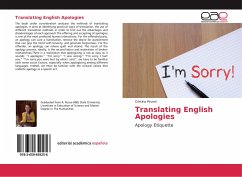
Translating English Apologies
Apology Etiquette
Versandkostenfrei!
Versandfertig in 6-10 Tagen
24,99 €
inkl. MwSt.

PAYBACK Punkte
12 °P sammeln!
The book under consideration analyzes the methods of translating apologies. It aims at identifying practical ways of translation, the use of different translation methods in order to find out the advantages and disadvantages of each approach.The offering and accepting of apologies is one of the most profound human interactions. For the offended party, an apology can cure a humiliation, remove the desire for punishment that can grip the mind with tenacity, and generate forgiveness. For the offender, an apology can relieve guilt and shame. The result of the apology process, ideally, is the recon...
The book under consideration analyzes the methods of translating apologies. It aims at identifying practical ways of translation, the use of different translation methods in order to find out the advantages and disadvantages of each approach.The offering and accepting of apologies is one of the most profound human interactions. For the offended party, an apology can cure a humiliation, remove the desire for punishment that can grip the mind with tenacity, and generate forgiveness. For the offender, an apology can relieve guilt and shame. The result of the apology process, ideally, is the reconciliation and restoration of broken relationships.There is a realization that apologizing is not as easy as it sounds: "I apologize." "I'm sorry." "I was wrong." "I'm sorry I hurt you." "I'm sorry you were hurt by what I said.", we have to be familiar with some social factors, especially when apologizing among different languages. Indeed, we must be familiar with the cultural values that underlie apology as a speech act.












